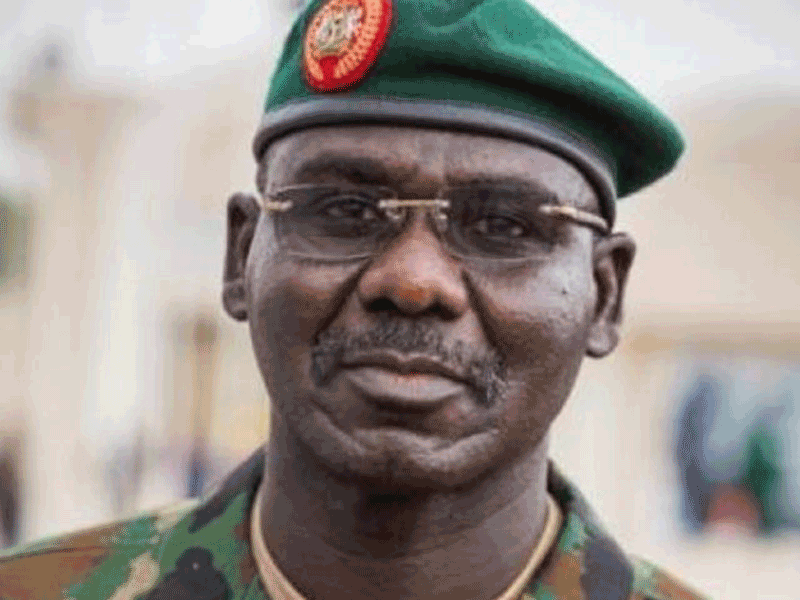- Nigerian Army, UN Clash Over Invasion of UN Building
The United Nations and the Nigerian Army on Friday clashed over the invasion of a building occupied by the world body on Friday in Maiduguri, Borno State.
The Army, in a statement on Friday, defended its action, saying the action was part of counter-insurgency activities of its Theatre Command Operation Lafiya Dole. The statement was signed by the 7th Division spokesperson, Kingsley Samuel.
It stated that it had been conducting cordon and search operations in urban and rural areas within the state.
According to the Army, the clearance operations have been yielding successes.
The Army stated, “It has forced the Boko Haram terrorists to change tactics and resort to the employment of suicide bombers to target military locations and the populace. This necessitated the need to intensify cordon and search in the Maiduguri metropolis and environment.
“In the last one week, cordon and search operations were conducted in Jiddari –Polo, Muna Garage, and Jakana amongst several other areas. On August 10, 2017, the Theatre Command received information from one of its credible sources that some high-value Boko Haram suspects had infiltrated into Pompomari Bypass.
“It, therefore, became expedient to take preemptive action by combing the general area through a cordon and search operation. The operation was successfully conducted as over 30 houses were searched.
“One of such included a property, which was said to be occupied by the United Nations staff members, although the property did not carry a UN designation.
“On the whole, the operation in the general area was successfully concluded but no arrest was made because the suspects were not found.”
Search without authorisation –UN
But the UN, in a statement said its Humanitarian Coordinator for Nigeria, Edward Kallon, stated that the search was without authorisation. The statement was signed by its Head of Communications, Samantha Newport.
Kallon expressed grave concern over the unauthorised search of the UN base for humanitarian workers in Maiduguri.
Kallon stated, “At circa 0500 hours today (Friday), members of the Nigerian security forces entered the UN base for humanitarian workers in Maiduguri without authorisation. The security forces carried out a search of the tented camp and left the area at circa 0800 hours.
“The United Nations does not have any information at this time regarding the reason or motivations for the unauthorised search. The Humanitarian Coordinator is working closely with the Government of Nigeria to resolve this issue. The humanitarian crisis in Nigeria’s North-East is one of the most severe in the world today.”
Kallon said that he was extremely concerned that the actions could be detrimental to the critical work that was being carried out every day to support the most vulnerable in the region, adding “I call upon the Government of Nigeria to provide clarification.
“The United Nations and more than 50 non-governmental humanitarian organisations are working in support of the Government of Nigeria to provide aid, including food, safe water and medicine, to some 6.9 million people in need in the Northeast.”
Army searching for Shekau in UN building –Report
An internal UN memo seen by the Agence France Presse suggested that the Nigerian forces might have been searching for the leader of the jihadist Boko Haram group, Abubakar Shekau, after rumours spread locally that he was hiding in the compound known as the “Red Roof”.
“Information about Shekau’s presence in the Red Roof was already being spread yesterday (Thursday) on the social media,” said the document, apparently issued by the UN’s Department of Safety.
“At about 2 a.m. early this morning, Nigerian Army troops in trucks are conducting… (a) search on UN Red Roof Humanitarian camp and forced their way into the property.”
All UN staff members in Maiduguri were ordered to work from home by the note, which warned of demonstrations against the organisation and other foreign groups active in the area.
A UN source told AFP such searches were illegal under international law and risk raising suspicions about the organisation’s work.
Nothing wrong with search –Tsav
A retired commissioner of police, Alhaji Abubakar Tsav, however, said there was nothing wrong with the search of the UN building by the military since it was geared towards the elimination of terrorism, a goal the world body was also working towards.
He observed that the military might not have informed the UN about its plans based on the time frame of the intelligence at its disposal.
Tsav said, “There is nothing wrong with the military searching the UN property. If they suspected that someone is hiding in the building, they could search it and I don’t think the UN should object since they are working towards the same goal of fighting insurgency.
“I don’t think the UN should be angry (over the search) unless it is supporting the insurgents,” the security expert added.
When contacted about the development and government’s position on it, the acting spokesperson, Ministry of Foreign Affairs, Mrs. Jane Adam, said, “I will find out and get back to you.”
She had yet to do so as of the time of filing this report. Later, she did not pick calls to her mobile phone.


 Forex2 weeks ago
Forex2 weeks ago


 Naira2 weeks ago
Naira2 weeks ago
 Naira4 weeks ago
Naira4 weeks ago
 Company News4 weeks ago
Company News4 weeks ago
 Billionaire Watch1 week ago
Billionaire Watch1 week ago




 Naira2 weeks ago
Naira2 weeks ago




 Naira4 weeks ago
Naira4 weeks ago




 Naira1 week ago
Naira1 week ago





















